-
 bitcoin
bitcoin $87959.907984 USD
1.34% -
 ethereum
ethereum $2920.497338 USD
3.04% -
 tether
tether $0.999775 USD
0.00% -
 xrp
xrp $2.237324 USD
8.12% -
 bnb
bnb $860.243768 USD
0.90% -
 solana
solana $138.089498 USD
5.43% -
 usd-coin
usd-coin $0.999807 USD
0.01% -
 tron
tron $0.272801 USD
-1.53% -
 dogecoin
dogecoin $0.150904 USD
2.96% -
 cardano
cardano $0.421635 USD
1.97% -
 hyperliquid
hyperliquid $32.152445 USD
2.23% -
 bitcoin-cash
bitcoin-cash $533.301069 USD
-1.94% -
 chainlink
chainlink $12.953417 USD
2.68% -
 unus-sed-leo
unus-sed-leo $9.535951 USD
0.73% -
 zcash
zcash $521.483386 USD
-2.87%
Is it dangerous for the MFI indicator to cross twice above 80? How to judge in combination with the distribution of chips?
The Money Flow Index (MFI) helps gauge buying/selling pressure; a double cross above 80 may signal caution, especially when paired with on-chain data like whale activity or volume trends.
Jun 19, 2025 at 01:42 pm
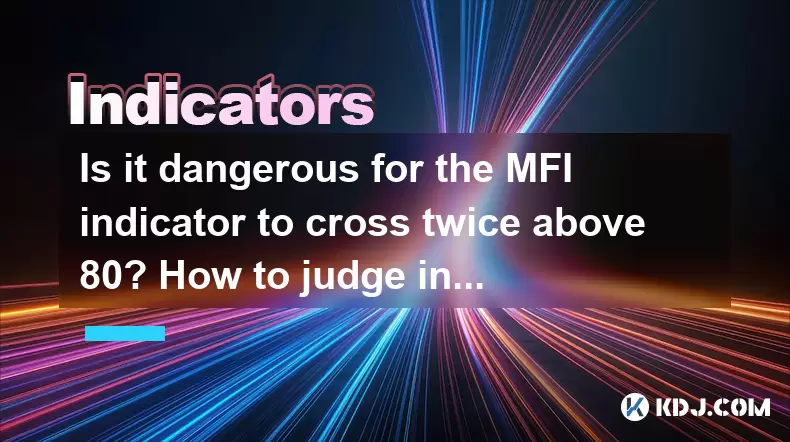
Understanding the MFI Indicator and Its Significance
The Money Flow Index (MFI) is a momentum oscillator used in technical analysis to measure buying and selling pressure. It combines price and volume data to assess overbought or oversold conditions in an asset, including cryptocurrencies. The indicator ranges from 0 to 100, with levels above 80 typically considered overbought, and below 20 as oversold.
In the context of cryptocurrency trading, where volatility is high and market sentiment shifts rapidly, understanding how the MFI behaves becomes crucial. When the MFI crosses above 80 twice within a short time frame, it can raise concerns among traders about potential reversals or false signals.
What Does a Double Cross Above 80 Indicate?
When the MFI crosses above the 80 threshold more than once, it suggests that there are repeated spikes in buying pressure. However, this doesn’t necessarily mean danger — rather, it signals caution. In many cases, especially during strong uptrends, the MFI can remain above 80 for extended periods without a significant pullback.
- A double cross above 80 could indicate either sustained bullish momentum or an exhaustion phase.
- If each subsequent cross happens with diminishing volume, it may suggest weakening demand and an impending reversal.
- Conversely, if the crosses coincide with increasing volume and higher highs in price, the rally might still have legs.
It’s essential not to interpret the MFI in isolation but rather in conjunction with other indicators and market structure elements.
The Role of Chip Distribution in Market Analysis
In traditional markets, chip distribution refers to the accumulation and dispersion of shares among investors. In cryptocurrency, we adapt this concept to understand on-chain accumulation and distribution patterns. These patterns are often inferred through wallet activity, large whale movements, exchange inflows/outflows, and realized cap metrics.
Analyzing chip distribution alongside the MFI helps traders better contextualize whether the price movement is supported by institutional or smart money behavior.
- If the MFI crosses above 80 twice while distribution is occurring, such as whales offloading holdings or long-term holders moving coins to exchanges, it increases the likelihood of a bearish reversal.
- On the contrary, if chip distribution shows accumulation, especially at resistance zones or after corrections, even a double MFI overbought signal may precede further upward movement.
How to Combine MFI Signals with On-Chain Metrics
To effectively judge the reliability of an MFI overbought scenario, integrating on-chain analytics provides deeper insight:
- Use tools like Glassnode or Santiment to monitor metrics such as:
- Exchange inflows and outflows: Sudden spikes in outflows may indicate accumulation.
- Spent output profit ratio (SOPR): Helps determine if holders are realizing profits.
- Long-term holder behavior: Rising balances among long-term wallets can signal strength.
When analyzing a double cross above 80:
- Check if the price is encountering resistance zones or breaking out of consolidation areas.
- Evaluate whether on-chain volume supports the move upwards.
- Look for signs of whale accumulation or distribution during these crosses.
This multi-layered approach prevents traders from acting on false signals and improves decision-making accuracy.
Practical Steps to Assess Risk During a Double Overbought Signal
If you observe the MFI crossing above 80 twice, here’s how to proceed methodically:
- Monitor price action closely around key resistance or Fibonacci extension levels.
- Observe whether each subsequent cross coincides with higher volume and stronger candlesticks.
- Track on-chain accumulation metrics to see if smart money is still supporting the trend.
- Watch for divergences between MFI and price — for example, if the price makes a new high but the MFI does not.
- Consider using moving averages or Bollinger Bands to filter out noise and confirm trend direction.
By combining these steps, traders can better assess whether the overbought condition is part of a healthy trend or a warning sign of an imminent correction.
Frequently Asked Questions
Q: Can MFI be trusted in highly volatile crypto markets?A: Yes, but with caution. MFI works best when combined with volume and on-chain metrics, especially in fast-moving environments like crypto. Always use it in tandem with other tools.
Q: What if MFI stays above 80 for multiple days?A: This indicates strong buying pressure and doesn't automatically imply a reversal. Focus on whether price continues to make higher highs and whether accumulation is ongoing.
Q: How do I differentiate between healthy overbought and dangerous overbought?A: Healthy overbought occurs with rising volume, strong on-chain accumulation, and no divergence. Dangerous overbought usually comes with declining volume, whale distribution, and negative divergences.
Q: Are there specific crypto assets where MFI works better?A: MFI tends to work better on larger-cap cryptocurrencies with consistent volume, such as BTC or ETH, rather than low-liquidity altcoins where erratic price swings are common.
Disclaimer:info@kdj.com
The information provided is not trading advice. kdj.com does not assume any responsibility for any investments made based on the information provided in this article. Cryptocurrencies are highly volatile and it is highly recommended that you invest with caution after thorough research!
If you believe that the content used on this website infringes your copyright, please contact us immediately (info@kdj.com) and we will delete it promptly.
- Bitcoin's Rocky Road: Inflation Surges, Rate Cut Hopes Fade, and the Digital Gold Debate Heats Up
- 2026-02-01 09:40:02
- Bitcoin Shows Cheaper Data Signals, Analysts Eyeing Gold Rotation
- 2026-02-01 07:40:02
- Bitcoin's Latest Tumble: Is This the Ultimate 'Buy the Dip' Signal for Crypto?
- 2026-02-01 07:35:01
- Big Apple Crypto Blues: Bitcoin and Ethereum Stumble as $500 Billion Vanishes Amid Macroeconomic Whirlwind
- 2026-02-01 07:35:01
- Michael Wrubel Crowns IPO Genie as the Next Big Presale: A New Era for Early-Stage Investments Hits the Blockchain
- 2026-02-01 07:30:02
- XRP, Ripple, Support Level: Navigating the Urban Jungle of Crypto Volatility
- 2026-02-01 06:35:01
Related knowledge
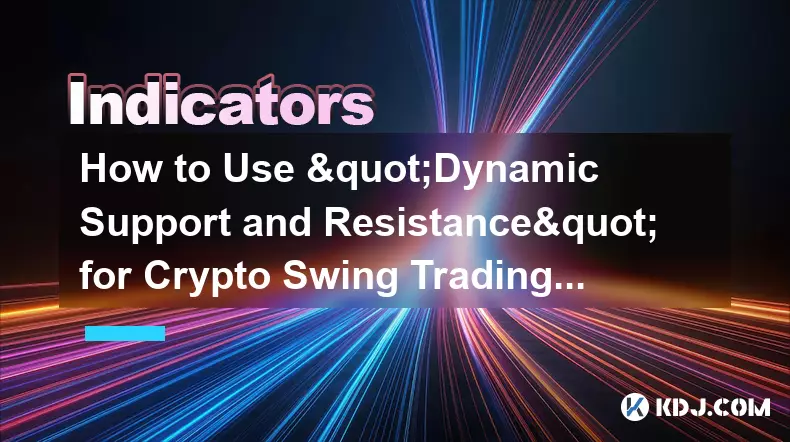
How to Use "Dynamic Support and Resistance" for Crypto Swing Trading? (EMA)
Feb 01,2026 at 12:20am
Understanding Dynamic Support and Resistance in Crypto Markets1. Dynamic support and resistance levels shift over time based on price action and movin...
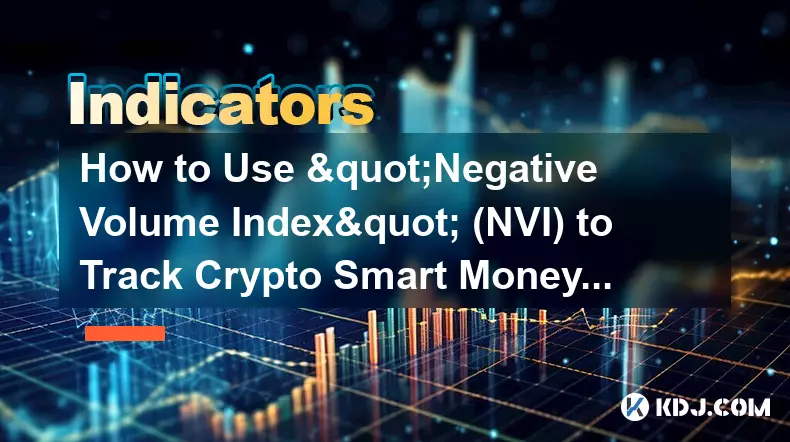
How to Use "Negative Volume Index" (NVI) to Track Crypto Smart Money? (Pro)
Feb 01,2026 at 02:40am
Understanding NVI Mechanics in Crypto Markets1. NVI calculates cumulative price change only on days when trading volume decreases compared to the prio...
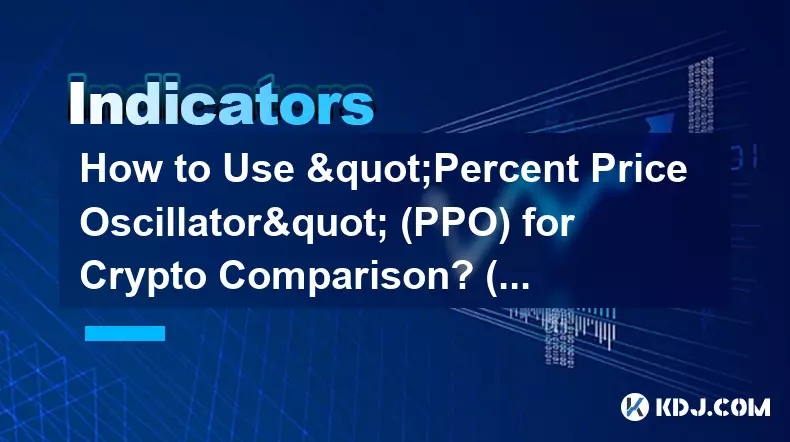
How to Use "Percent Price Oscillator" (PPO) for Crypto Comparison? (Strategy)
Feb 01,2026 at 01:59am
Understanding PPO Mechanics in Volatile Crypto Markets1. The Percent Price Oscillator calculates the difference between two exponential moving average...
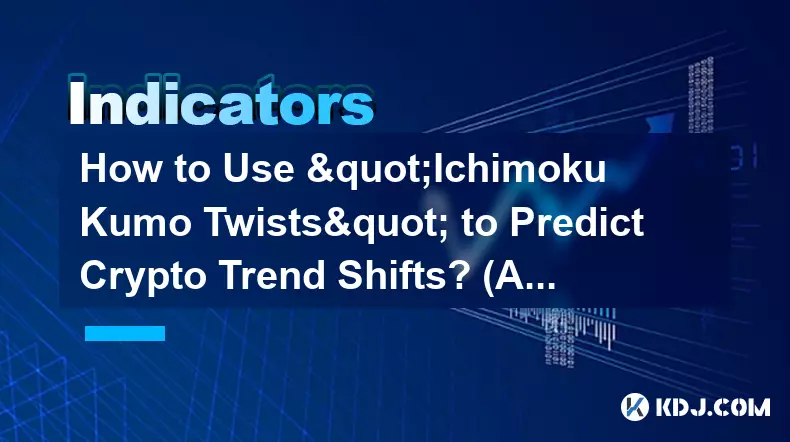
How to Use "Ichimoku Kumo Twists" to Predict Crypto Trend Shifts? (Advanced)
Feb 01,2026 at 10:39am
Understanding the Ichimoku Kumo Structure1. The Kumo, or cloud, is formed by two boundary lines: Senkou Span A and Senkou Span B, plotted 26 periods a...
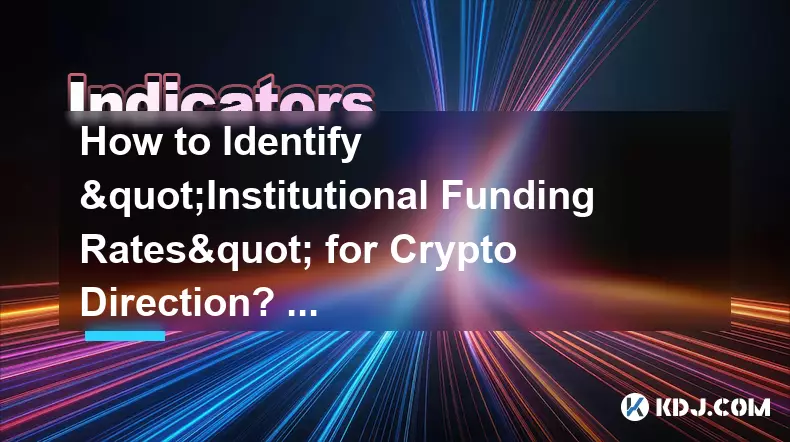
How to Identify "Institutional Funding Rates" for Crypto Direction? (Sentiment)
Feb 01,2026 at 07:20am
Understanding Institutional Funding Rates1. Institutional funding rates reflect the cost of holding perpetual futures positions on major derivatives e...
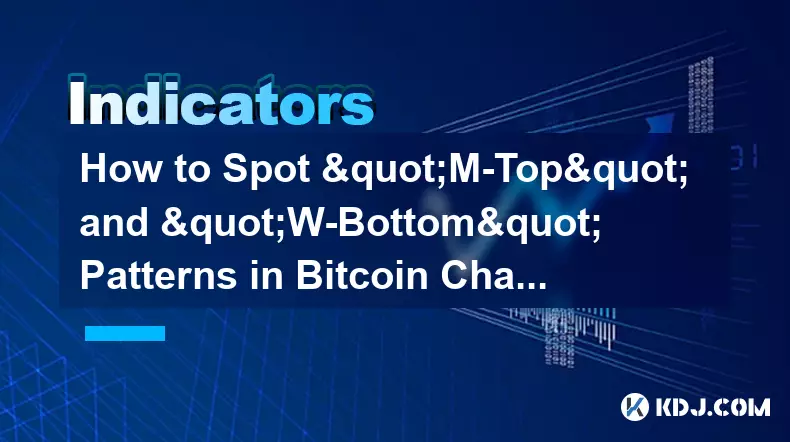
How to Spot "M-Top" and "W-Bottom" Patterns in Bitcoin Charts? (Classic TA)
Feb 01,2026 at 05:59am
Understanding M-Top Formation Mechanics1. An M-Top emerges after a sustained bullish phase where Bitcoin price reaches a local peak, pulls back, ralli...

How to Use "Dynamic Support and Resistance" for Crypto Swing Trading? (EMA)
Feb 01,2026 at 12:20am
Understanding Dynamic Support and Resistance in Crypto Markets1. Dynamic support and resistance levels shift over time based on price action and movin...

How to Use "Negative Volume Index" (NVI) to Track Crypto Smart Money? (Pro)
Feb 01,2026 at 02:40am
Understanding NVI Mechanics in Crypto Markets1. NVI calculates cumulative price change only on days when trading volume decreases compared to the prio...

How to Use "Percent Price Oscillator" (PPO) for Crypto Comparison? (Strategy)
Feb 01,2026 at 01:59am
Understanding PPO Mechanics in Volatile Crypto Markets1. The Percent Price Oscillator calculates the difference between two exponential moving average...

How to Use "Ichimoku Kumo Twists" to Predict Crypto Trend Shifts? (Advanced)
Feb 01,2026 at 10:39am
Understanding the Ichimoku Kumo Structure1. The Kumo, or cloud, is formed by two boundary lines: Senkou Span A and Senkou Span B, plotted 26 periods a...

How to Identify "Institutional Funding Rates" for Crypto Direction? (Sentiment)
Feb 01,2026 at 07:20am
Understanding Institutional Funding Rates1. Institutional funding rates reflect the cost of holding perpetual futures positions on major derivatives e...

How to Spot "M-Top" and "W-Bottom" Patterns in Bitcoin Charts? (Classic TA)
Feb 01,2026 at 05:59am
Understanding M-Top Formation Mechanics1. An M-Top emerges after a sustained bullish phase where Bitcoin price reaches a local peak, pulls back, ralli...
See all articles





















![THIS IS THE HARDEST COIN TO GET [POLY DASH] THIS IS THE HARDEST COIN TO GET [POLY DASH]](/uploads/2026/01/31/cryptocurrencies-news/videos/origin_697e0319ee56d_image_500_375.webp)




















































